Long Distance Caregiving
💡 Quick Summary
-
Care partners who live afar can help and offer support in many ways.
-
Stay informed about your loved one’s health, medications, doctors and local care providers and keep financial and legal documents accessible.
-
Offer practical help such as paying for groceries, medical supplies, household services, respite care or visiting to give the primary caregiver a break.
-
Be respectful of the primary caregiver’s role, avoid giving unsolicited advice or making promises you can’t keep and focus on support rather than hands-on care.

People who live far away may wonder how they can help their loved one with Parkinson’s disease (PD) in a meaningful way. Living out of town does not mean you are not involved or do not care. There are limitations to what you can do in all situations, especially from afar, but you can still help in many ways.
Primary Caregiving from Afar
Despite the distance, you must be well-versed in the needs and status of the person with Parkinson’s. Learn about his or her general health and all medications taken. Keep a list of your loved one’s doctors, specialists, pharmacist, care providers and neighbors along with contact information. Also keep financial and legal documents easily accessible in case they are needed.
Communicate regularly with the person with Parkinson’s and his or her local care providers, whether that means an in-home aide or the staff at a care facility. If your loved one’s needs change, you need to know what that will mean for him or her: more skilled in-home care, visits with a different medical specialist, additional prescriptions, new diet regimens. This can also mean more changes for you: more visits home, higher costs for care, etc. You can help assess changing needs during each visit.
Get Local Help
If you feel that you cannot adequately keep track of everything from afar, a geriatric care manager might be able to help. This rapidly growing professional group provides a variety of services, such as arranging financial, legal and medical services, in-home care providers and transportation, and they regularly communicate with family members.
Fees vary depending on what services are needed, and it is important to know that geriatric care managers are not currently required to be certified by states or the federal government. Therefore, it is recommended that you personally interview the prospective care manager, ideally during one of your visits, before hiring someone.
Be Kind to Yourself
Caregiving from a distance can be emotionally taxing, so make sure you have a support system in place.

Secondary Caregiving from Afar
Most people have established families and careers that preclude moving back to the hometown or current location of a loved one who needs daily care. How can long-distance relatives help, short of moving? Let the person with Parkinson’s and the primary caregiver know you are still there for them.
What to Do
Learn About Parkinson’s
You will be better able to support the person with Parkinson’s and the primary caregiver if you have at least a basic understanding of the disease. To start, explore our free resources, such as our PD Library and our Understanding Parkinson’s section for information on diagnosis, symptoms, treatment, and more.
Call Every Week
Set a designated day and time and make the call faithfully. Don’t assume that “no news is good news.” Even during extremely tough times, many people do not want to bother their adult children or other relatives who are “busy with their own lives.”
Consider using FaceTime, Skype or another video call service so you can see each other on the call.
Talk Finances
Inquire tactfully but clearly. Many people won’t ask for financial help, even if the limitations of a fixed income and medication costs mean doing without vital supplies. If a regular subsidy is unacceptable, offer something specific. When health insurance does not cover medication costs, offering to pay for a month’s supply can be a great relief.
Looking for ways you can financially help? Offer to buy groceries online, medical products (like incontinence pads or assistive technology devices); help with household utility bills, transportation costs, housecleaning or yard services will also be appreciated.
Send A Surprise Caregiver Gift Monthly
This might be a bouquet of flowers, a restaurant gift certificate or a pampering basket filled with elegant bath supplies. Be creative. Even a card with an encouraging hand-written message can mean a lot to the local caregiver in the middle of a trying week.
Visit
Budget funds for regular trips to check on your family and plan with the primary caregiver to provide them with respite.
- Don’t add to the primary caregiver’s stress level by expecting him or her to take care of you, too! Consider staying at a nearby hotel room.
- Remember you are there to provide a listening ear and a helping hand.
- Try to visit when your loved one sees their neurologist, so you can attend the appointment. The doctor might ask you for observations, and you will learn about your family’s communication style and be able to reinforce the doctor’s instructions later.
- Check in with the caregiver. Is your mom’s mammogram overdue? Has you dad seen his general practitioner lately? Talk healthcare.
- Offer to take over caregiving responsibilities during your visit so the primary caregiver can get respite and/or catch up on their health appointments.
Provide Respite
If filling in personally is not possible, offer to pay for a respite stay in an extended care facility. Or, if your loved one can travel, invite them to visit you. While visiting, the primary caregiver gets a welcome break from their usual caregiving responsibilities.
If and when the time comes, exercise your right as the out-of-towner with less caregiving burden to affirm the difficult decision to move your loved one with PD in a residential care facility.
Be respectful of the fact that you are not the person providing day-to-day care, and therefore may not fully recognize how caregiving responsibilities have grown. It is a mistake to allow worries about cash flow, sibling rivalry or dwindling inheritances get in the way of doing what’s best for the people whose lives are most affected.
What Not to Do
It might feel like you need permission to help. Don’t give up offering to help. There are many ways you can offer support, outlined above. Work with the primary care partner to find how you can be of the most help.
Don’t underestimate the severity of day-to-day Parkinson’s symptoms, as well as the level of caregiver burden of advancing PD. For example, providing physical care to someone with advanced PD, such as helping with bathing, can be exhausting and even cause injury to the caregiver.
Don’t forget that thinking and memory changes are also part of PD, and difficult to handle. They are often more taxing than physical changes for both the care partner and person with PD.
Do not offer advice as a replacement for hands-on care. While this may help those who do not live nearby assuage feelings of guilt, they do not see the day-to-day of this disease. They may have the ability to “see the forest instead of the trees,” but there is no need to share this insight. Steer free of criticism for family members who live close by and carry the greater responsibility of caregiving.
While it may be well-intentioned, do not make rash promises to the person with PD that may be impossible to keep. Rather than saying, “Oh Dad, of course we’d never put you in a nursing home,” it is better to express your empathy for your loved one’s preference to live at home and affirm your willingness to discuss alternatives if the need arises.
Related Materials
Expert Briefing: Living Alone: Home Safety & Management
Coping Skills for Care Partners
Care Partner Summit Archives
Related Blog Posts

3 Essential Resources for 3 Different Kinds of Care Partners

Advanced Parkinson’s Care: Practical Ways to Help Your Loved One
